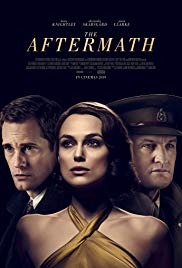
THE AFTERMATH
UK, 2019, 108 minutes, Colour.
Keira Knightley, Alexander Skarsgaard, Jason Clarke, Martin Compston, Flora Thiemann, Kate Phillips.
Directed by James Kent.
The immediate impression of the title is the aftermath of World War II, specifically the victory of the Allies, the role of the British in occupied Germany, the devastation and bombings of cities, especially in this case, of Hamburg. The production design has done an extraordinary job, combined with special effects, to make the audience feel that it is really visiting the city at the end of 1945.
The other impression of the title comes later in the film, after the focus on the three central characters, Lewis, the British commander in Hamburg, the arrival of his wife, Rachel, quite unwilling to come to the city, and Stephen, the owner of the house where they are billeted, his wife dead in the bombardments, a resentful daughter. Their tensions, love and betrayal amongst the three. The climax of this film is how it behaves in the aftermath. The three characters are well played by Jason Clarke as Lewis, Keira Knightley as Rachel, Alexander Skarsgaard as Stephen.
The audience can understand Lewis and his sense of commitment to his work, his relationship with his staff, with protesters outside the British headquarters, with disturbances in the Russian sector. He is a man of duty, devoted to his wife. Rachel, on the other hand, as mentioned, is quite reluctant to come to Germany, often feels neglected by her duty-bound husband, with the revelation about their past life, marriage, the death of their son and its consequences. Stephen seems to be a good man, courteous, accepting the situation with his house in the setting up of zones iin his house as well as trying to control his rebellious daughter.
It is not difficult to see where the dynamic of the plot is going. While Rachel has the possibility of socialising with other military personnel and their wives, she is still essentially lonely, taking some solace in music, playing the piano, offering the opportunity for the daughter to join her in Debussy’s Clair de Lune, listening to operatic recordings, becoming less strict about access zones in the house, Stephen and daughter relegated to the attic initially. And Stephen is interrogated severely by the British to prove that he is not a Nazi sympathiser.
Rachel points out that her relationship with Stephen was not necessarily a loving relationship but, rather, each of them had needs which they thought the other could fulfil.
Which means then that confronted with Lewis’ admission of neglect, blame, after the death of their son, Rachel has to make a choice – what is to be the aftermath?
1. The title? The aftermath of World War II, in Germany, occupation? The Arthur maths of the affair, consequences?
2. The Hamburg sitting, the bombed city and its ruins, Château, homes, British officers, the musical score?
3. 1945-1946, postwar Germany, the Allies and occupation, the British, the Germans subdued?
4. The Russian sector?
5. The setting for the romance and the affair?
6. Audience attitudes towards the central characters, moral judgements of them, blame, learning more about them, motivations, modifying perspectives?
7. Rachel coming in by train at the beginning? At the station at the end, not going?
8. Rachel, sad, going to Germany, and willing, hostile to the Germans, to the family and their place in the mansion? Zones and strict rules? Alone? Unpacking her son’s pullover? The socials and outings, the restaurant, Susan and discussions? The piano, Frieda playing the piano? The hostility, the servants, the working the house, the Garden? Stephen Lubin playing the record, the change of attitude? Her playing the Debussy? The kiss? The meals together, Frieda playing the piano with Rachel? The promise of the hairstylist? The beginning of the affair, going to the country? Lewis, his work at the office, always away? The distance between them? His going to the Russian zone, returning, Christmas, Steven getting his permit to stay? The social, the dancing, the realisation of the truth? Rachel’s decision?
9. Lewis, hard work, authority in Hamburg, his relationship with his staff? The violence of the protests outside the office, going to Russian zone? With Rachel, coldness, the gradual revelation about the death of their son, his not taking leave, is blaming Rachel? His grief? The interviews, listening in to Stephen’s interview? His wanting to help, genial with the family and their stay? The clash with the Scott and his interrogation? His drinking?
10. Rachel and Lewis, the frank talk about the relationship, their son and his death? The dinner, the dance, Lewis’s anger, leaving, the ambush, the death of the driver, the pursuit of the young man, his death on the ice?
11. Stephen, in himself, the memories of his wife, her wealth, his being an architect, love for his daughter, staying in the house, the zones, his respecting them? Playing the music, kissing Rachel, his need, the excursion together, his asking her to leave with him?
12. Freda, the young German boy, doing the hard work in cleaning up, discoveries of the bodies and the bombs? His works and assessment, the ambush, fleeing the ice, his death?
13. The British staff, attitude towards the Germans, hostility, interrogations? The Scott and his drinking, his relationship with his wife?
14. Lewis and the new job in London, talking with Rachel? Rachel and her decision to leave, Lewis sad, her going to the station, Rachel’s realisation, her explaining to Stephen that there was a mutual need, the decision to stay, the return?